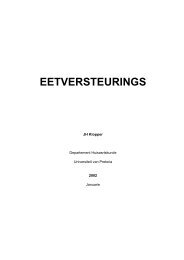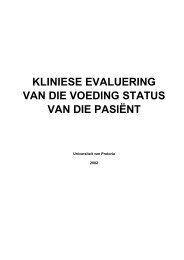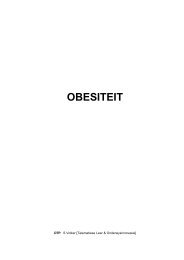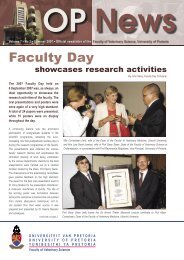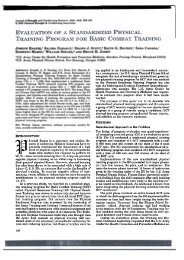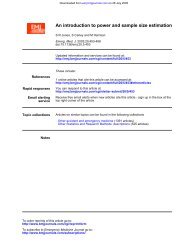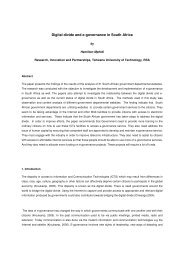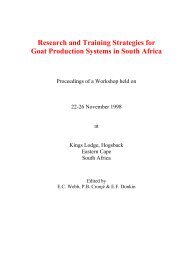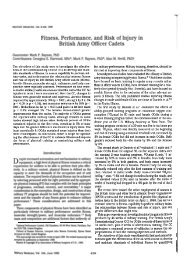NUTRITION INFANCY AND CHILDREN - University of Pretoria
NUTRITION INFANCY AND CHILDREN - University of Pretoria
NUTRITION INFANCY AND CHILDREN - University of Pretoria
You also want an ePaper? Increase the reach of your titles
YUMPU automatically turns print PDFs into web optimized ePapers that Google loves.
<strong>INFANCY</strong> <strong>AND</strong> <strong>CHILDREN</strong><br />
3<br />
_____________________________________________________________________________<br />
3. High palate: The nipple does not fit into the mouth (palate) <strong>of</strong> the baby. Use a bottle with<br />
expressed breast milk or formula feed.<br />
4. Weight gain: Weigh the baby before and after a feeding session. He needs to gain 100 g<br />
per session = 100 ml.<br />
5. Baby does not want to drink: Here it is important to look for a secondary cause which<br />
may include:<br />
� Urinary tract infection.<br />
� Bilateral reflux.<br />
� Heartburn.<br />
� Emotional deprivation.<br />
� Congenital or other acquired disease.<br />
6. Too much weight gain:<br />
� Weighing with clothes on or with a wet nappy.<br />
� Overfeeding.<br />
QUESTIONS ANSWERS<br />
Why does a low birth-weight baby need<br />
more frequent feeding?<br />
Give 5 possible reasons for an infant who<br />
refuses to drink.<br />
Give 1 common complication <strong>of</strong> breastfeeding<br />
exclusively without<br />
supplementation.<br />
2. LACTATING MOTHER<br />
Hypoglycaemia.<br />
Vomiting.<br />
Choking.<br />
Copyright © <strong>University</strong> <strong>of</strong> <strong>Pretoria</strong><br />
Urinary tract infection.<br />
Bilateral reflux.<br />
Heartburn.<br />
Emotional deprivation.<br />
Congenital or other acquired disease.<br />
Iron deficiency.<br />
It is possible to enjoy breastfeeding a baby, but a woman needs to be positively influenced and<br />
motivated by all medical staff involved in her pregnancy.<br />
Problems may arise during the first week and a poorly motivated mother may not be able to<br />
overcome these obstacles on her own.<br />
Wear a good quality brassière with good support.<br />
It is important to check for iron and folic acid deficiency in the lactating mother - she has to use an<br />
iron and folic acid combination supplement while lactating.<br />
Problems during lactation:<br />
� After birth pains: Explain to the new mother that it is caused by the release <strong>of</strong> oxitocin in the<br />
blood and contraction <strong>of</strong> the uterus. They always accept it if it is stressed that this would lead to<br />
a normal sized uterus quicker and a normal figure as well.<br />
� Not enough milk: It depends on the medical team – motivate the mother to persevere. After 6<br />
weeks postpartum the milk production stabilizes (the mother relaxes and is used to a new<br />
routine). It needs to be stressed that if she can continue for 6-8 weeks, the rest will be very<br />
easy and always beneficial to the baby.




